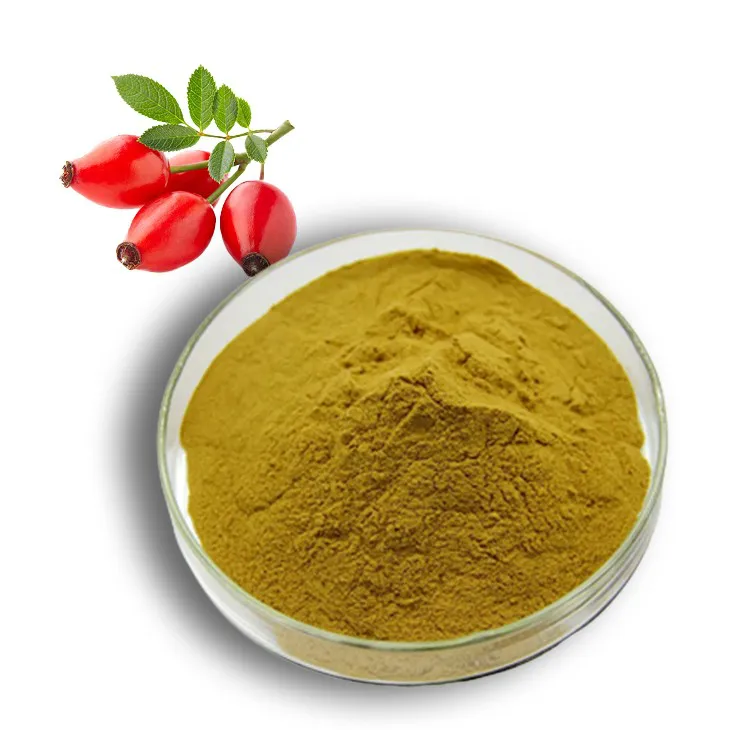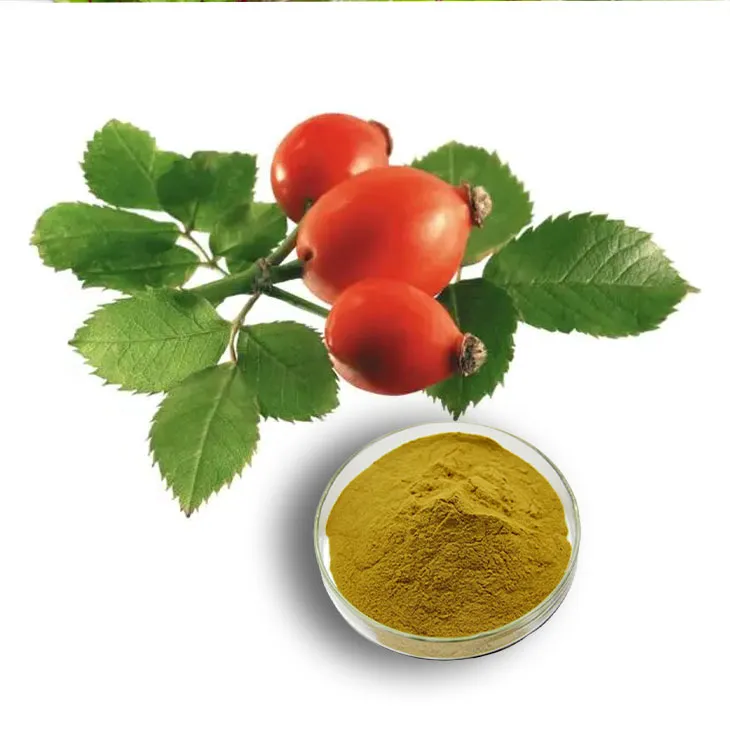- 0086-571-85302990
- sales@greenskybio.com
4 Things Consumers and Manufacturers Should Know about Rose Hip Extract.
2024-12-21

1. Introduction
Rosehip extract has been making waves in a variety of industries in recent years. From the health and wellness sector to the cosmetics and food industries, it has become a popular ingredient. For consumers, it represents a natural source of potential health benefits, while for manufacturers, it offers new product development opportunities. However, both consumers and manufacturers need to be well - informed about certain aspects of Rose Hip Extract to make the most of it.

2. For Consumers: Know the Origin and Sourcing
Origin of Rosehips
Rosehips are the fruit of roses, and they can be found in various regions around the world. Different species of roses produce rosehips with potentially different characteristics. For example, the wild rose species often found in Europe and Asia are a common source of rosehip extract. Understanding the origin of the rosehips used in the extract can give consumers an idea of the quality and potential properties of the product.
Sourcing Considerations
-
Clean Environments: High - quality rosehips are typically sourced from clean environments. This is important because rosehips that grow in polluted areas may contain contaminants that can find their way into the extract. For instance, if the roses are grown near industrial areas with high levels of heavy metals in the soil, there is a risk that the rosehips will absorb these metals, and subsequently, the extract may also be contaminated.
-
Sustainable Practices: Consumers are increasingly interested in products that are sourced sustainably. When it comes to rosehip extract, this means looking for manufacturers who source their rosehips from farms or wild - harvesting operations that follow sustainable practices. This could include things like proper management of wild rose populations to ensure they are not over - harvested, and using farming methods that are environmentally friendly, such as organic farming which reduces the use of pesticides and fertilizers.

3. For Both: Understand the Extraction Methods
Importance of Extraction Methods
The method used to extract the beneficial compounds from rosehips can significantly impact the final product's efficacy. Different extraction methods can yield different concentrations of active ingredients, such as antioxidants, vitamins, and fatty acids.
Common Extraction Methods
-
Solvent Extraction: This is one of the most common methods. It involves using a solvent, such as ethanol or hexane, to dissolve the desired compounds from the rosehip. However, the choice of solvent is crucial. For example, ethanol is often preferred in the food and supplement industries because it is considered a relatively safe solvent for human consumption. Hexane, on the other hand, may leave behind residues that could be harmful if not removed completely, so it is more commonly used in industrial applications where further purification steps are involved.
-
Supercritical Fluid Extraction: This method uses supercritical fluids, typically carbon dioxide (CO₂), as the extracting agent. Supercritical CO₂ has properties that make it an excellent solvent for extracting bioactive compounds from rosehips. It can operate at relatively low temperatures, which helps to preserve the heat - sensitive components of the rosehip. Additionally, it is easy to remove the CO₂ after extraction, leaving behind a relatively pure extract.
-
Cold - Pressing: In this method, the rosehips are mechanically pressed to extract the oil. This is a more natural approach as it does not involve the use of solvents. Cold - pressed rosehip oil is often considered a high - quality product, especially in the cosmetics industry, as it retains many of the natural compounds of the rosehip. However, the yield from cold - pressing is generally lower compared to solvent - based methods.

4. For Consumers: Be Aware of Potential Side - Effects and Precautions
Allergic Reactions
Some individuals may be allergic to rosehip extract. Symptoms of an allergic reaction can include skin rashes, itching, swelling, and in severe cases, difficulty breathing. People with known allergies to roses or related plants should be particularly cautious when using products containing rosehip extract. It is advisable to perform a patch test on a small area of skin before using a new product that contains rosehip extract, especially if it is a topical application like a cream or lotion.
Interaction with Medications
Rosehip extract may interact with certain medications. For example, it contains vitamin C, which can affect the absorption of some drugs. If you are taking medications, especially those for blood thinning or iron absorption, it is important to consult your doctor before starting to use rosehip extract supplements. The high vitamin C content in rosehip extract could potentially increase the effects of blood - thinning medications, leading to an increased risk of bleeding.
Pregnancy and Breastfeeding
There is limited research on the safety of rosehip extract during pregnancy and breastfeeding. As a precaution, pregnant and breastfeeding women should avoid using rosehip extract supplements or products with high concentrations of rosehip extract unless recommended by a healthcare professional. While rosehips are a natural product, the potential effects on the developing fetus or nursing infant are not well - understood.
5. For Manufacturers: Comply with Regulations
Food and Supplement Regulations
If the rosehip extract is intended for use in food products or dietary supplements, manufacturers must comply with strict food and supplement regulations. These regulations vary from country to country but generally cover aspects such as labeling requirements, purity standards, and safety assessments. For example, in the United States, the Food and Drug Administration (FDA) has specific guidelines for dietary supplements. Manufacturers need to ensure that their rosehip extract products are accurately labeled, including information about the ingredients, dosage, and any potential allergens.
Cosmetics Regulations
When rosehip extract is used in cosmetics, manufacturers must adhere to cosmetics regulations. These regulations are designed to ensure the safety of the products for consumers. In the European Union, for example, cosmetics products must be tested for safety and labeled with a list of ingredients in accordance with the Cosmetics Regulation. Manufacturers need to ensure that the rosehip extract used in their cosmetics products is of high quality and free from contaminants that could cause harm to the skin or eyes.
Good Manufacturing Practice (GMP)
Manufacturers should follow Good Manufacturing Practice (GMP) guidelines. GMP ensures that the production process is consistent, controlled, and of high quality. This includes aspects such as proper handling of raw materials, clean and hygienic production facilities, and trained staff. By following GMP, manufacturers can help to ensure that their rosehip extract products are safe, effective, and of consistent quality.
6. Conclusion
Rosehip extract has great potential in various industries, but both consumers and manufacturers need to be well - informed. Consumers should be aware of the origin, potential side - effects, and take necessary precautions when using products containing rosehip extract. Manufacturers, on the other hand, need to ensure quality control through proper extraction methods and compliance with regulations. By understanding these four key aspects, both parties can make the most of the benefits that rosehip extract has to offer.
FAQ:
What are the main health benefits of Rose Hip Extract for consumers?
Rose Hip Extract offers potential health benefits such as antioxidant properties. Antioxidants can help protect the body's cells from damage caused by free radicals, which may contribute to various health problems over time.
Why is the origin and sourcing of rose hips important?
The origin and sourcing of rose hips are crucial because high - quality rosehips from clean environments are more likely to yield better extracts. Clean environments reduce the risk of contaminants in the rosehips, which can then lead to a purer and more effective extract.
How do different extraction methods affect the efficacy of rose hip extract?
Different extraction methods can have a significant impact on the final product's efficacy. Some extraction methods may be more efficient at preserving the active compounds in the rose hips, while others may cause degradation or loss of these beneficial substances. For example, improper extraction techniques might damage the antioxidant properties of the extract, reducing its potential health benefits.
What are the potential side - effects of rose hip extract that consumers should be aware of?
While rose hip extract is generally considered safe for most people, some individuals may experience side - effects. These can include gastrointestinal issues such as nausea, diarrhea, or stomach upset in some cases. Additionally, in rare instances, allergic reactions may occur, especially in those who are allergic to roses or related plants.
What regulations do manufacturers need to comply with for rose hip extract production?
Manufacturers must comply with various regulations for safe production. These can include food safety regulations, which ensure that the extract is free from harmful contaminants, produced under hygienic conditions, and properly labeled. There may also be regulations regarding the extraction process itself to ensure that it is carried out in a way that maintains the quality and safety of the product.
Related literature
- The Health Benefits of Rose Hip Extract: A Review"
- "Rose Hip Extract: Quality Control in Extraction and Manufacturing"
- "Understanding the Side - Effects of Rose Hip - Based Products"
- ▶ Hesperidin
- ▶ citrus bioflavonoids
- ▶ plant extract
- ▶ lycopene
- ▶ Diosmin
- ▶ Grape seed extract
- ▶ Sea buckthorn Juice Powder
- ▶ Beetroot powder
- ▶ Hops Extract
- ▶ Artichoke Extract
- ▶ Reishi mushroom extract
- ▶ Astaxanthin
- ▶ Green Tea Extract
- ▶ Curcumin Extract
- ▶ Horse Chestnut Extract
- ▶ Other Problems
- ▶ Boswellia Serrata Extract
- ▶ Resveratrol Extract
- ▶ Marigold Extract
- ▶ Grape Leaf Extract
- ▶ blog3
- ▶ blog4
- ▶ blog5
-
Pure 85% Tomentil Extract.
2024-12-21
-
Licorice Root Extract Powder
2024-12-21
-
Sophora Flavescens Root Extract
2024-12-21
-
Plantain extract
2024-12-21
-
Lemon Balm Extract
2024-12-21
-
Hesperidin
2024-12-21
-
Curcumin Extract
2024-12-21
-
Citrus Aurantium Extract
2024-12-21
-
Bayberry Extract
2024-12-21
-
Horse Chestnut Extract
2024-12-21
-
Hawthorn powder
2024-12-21





















